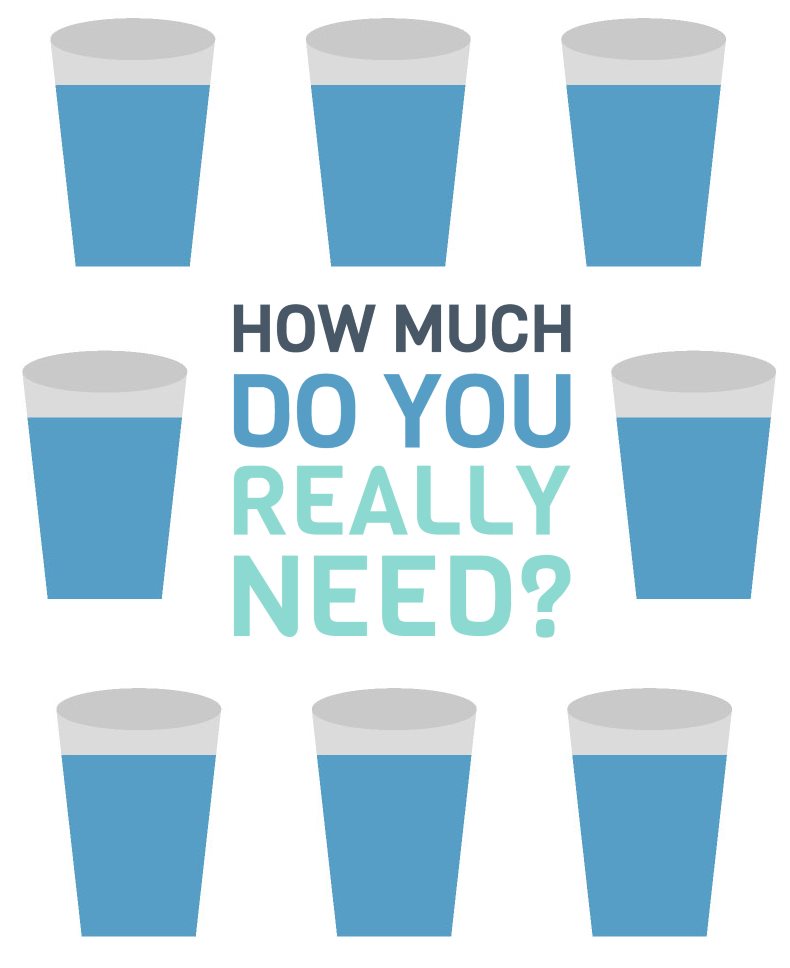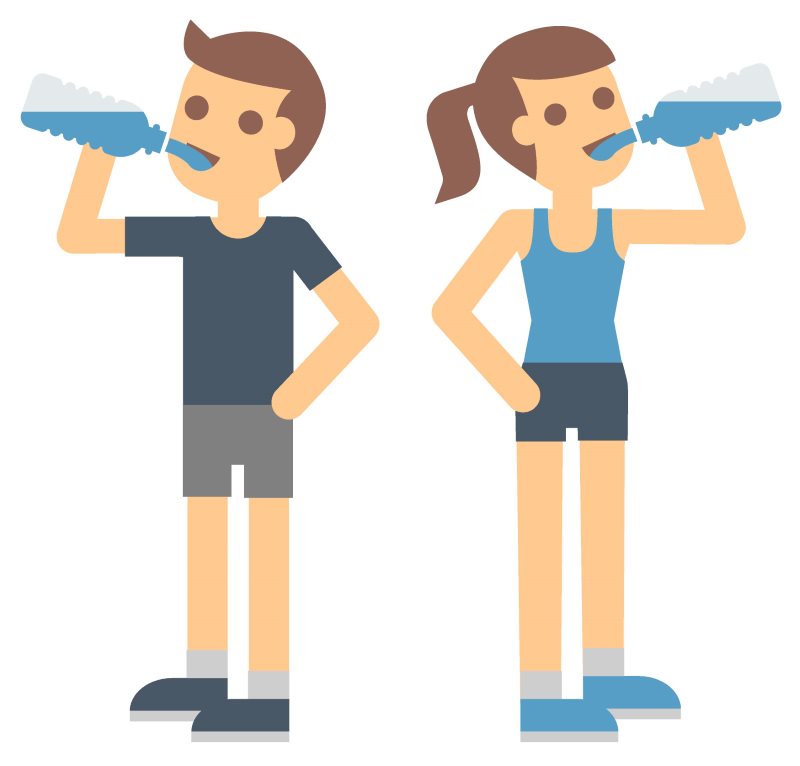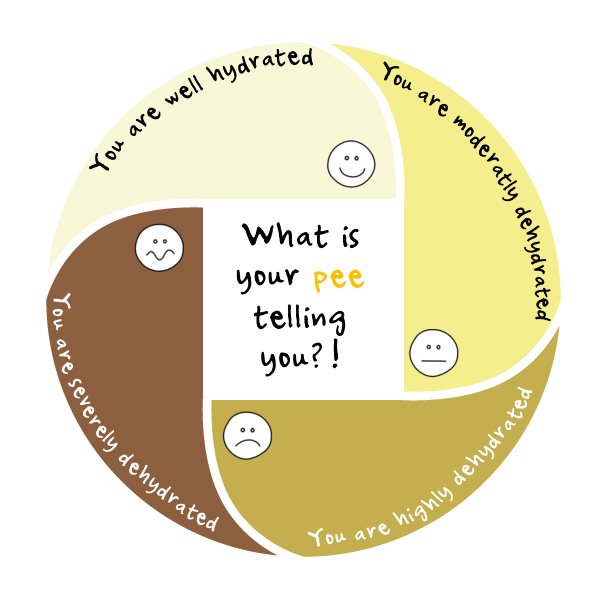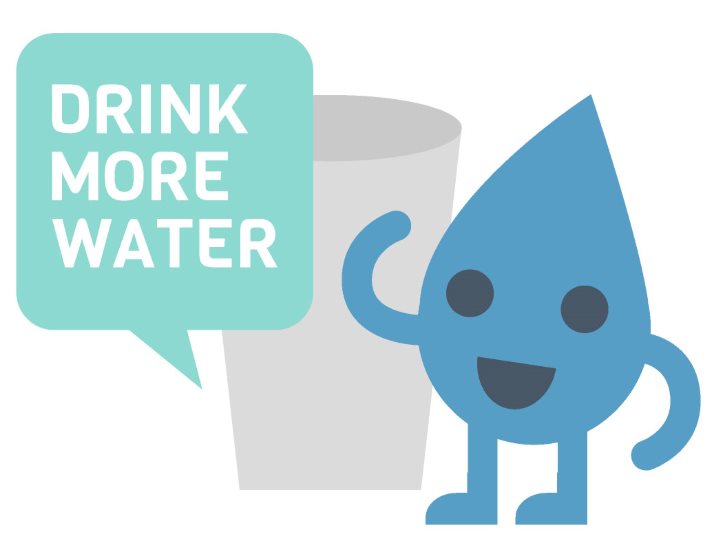The importance of water
Roughly 70 percent of an adult’s body is made up of water and all the major systems in your body depend on water, including your brain, lungs, blood, skin and muscles. It helps to convert food into energy and helps the body to absorb essential nutrients, so it’s no wonder a person cannot survive more than a few days without it.
So there is no denying that your body needs water to maintain good health, but just how much of it should you be drinking each day to keep your body healthy and happy?
How much water should you drink every day?
 You’ll have heard at some point that you should be consuming eight glasses of water a day, but is this REALLY the right amount? Who decided this? Is it different for men and women, and what about different lifestyles, weight or temperature?
You’ll have heard at some point that you should be consuming eight glasses of water a day, but is this REALLY the right amount? Who decided this? Is it different for men and women, and what about different lifestyles, weight or temperature?
Over the years, health researchers have suggested that this ‘recommended amount’ is actually a myth, since it’s not based on scientific research. So where did the myth come from in the first place?
Well, the earliest record of this ‘recommended amount’ is thought to date back to 1945 when it appeared in dietary guidelines published by The Food and Nutrition Board of the National Academy of Sciences in the USA. However, this recommendation was never actually based on any research or scientific findings.
Others have suggested that it was actually first cited by nutritionist Frederick J. Stare, who was also the founding chairman of the Department of Nutrition at the Harvard School of Public Health.
Nowadays, even government guidelines set out by The European Food Safety Authority still recommend roughly this amount. They advise that women should drink about 8 glasses of water (200ml each) and men should be drinking about 10 glasses of water (again 200ml each). That equates to approx. 1.6 litres of water per day for women and 2.0 litres of water per day for men.
Even though these amounts are widely recommended, they are also widely contested. Researchers have begun to suggest that eight glasses a day is an over-estimate and also that we can actually end up consuming more than this amount, due to the foods we eat.
These guidelines also don’t take into account that your needs can differ from others with different body types / weight, whether you exercise a lot, if you live in a warmer climate, if you consume a large amount of diuretics daily, such as tea and coffee, or even if the medication you take requires additional water consumption.
So how can you tell if you are drinking enough?
 With so many differing opinions about the exact amount of water you should drink each day, there really is only one reliable source that can let you know if you are drinking enough water and that’s your body!
With so many differing opinions about the exact amount of water you should drink each day, there really is only one reliable source that can let you know if you are drinking enough water and that’s your body!
Feeling dehydrated is your body’s way of telling you that it is not getting enough water! It occurs when you do not drink enough water to replace what has been lost. Everyday your body loses water through breathing, sweating, urinating and bowel movements, so this water must be continually replaced for your body to function properly. Luckily, your body gives you lots of signals to let you know that you are dehydrated.
How to tell if you are dehydrated
Are you thirsty?
Thirst is your body’s way of telling you to drink water; the more thirsty you get, the more dehydrated your body is, until you become so dehydrated that the thirst stops! Bizarrely, you can lose your thirst signal if you ignore it. However, as you start to increase you water intake, you will begin to regain your natural thirst again.
One thing to also keep in mind is that you may find that your sensation of thirst decreases as you get older. This can lead to a higher risk of dehydration, so it’s even more important to recognise other signs.
Check your urine
Not the most fun thing to do, but it’s worth keeping an eye on the colour of your urine. This is a good indicator of how hydrated (or dehydrated) you are. If you are properly hydrated the lighter your urine will be in colour (clear to pale straw), but as you become more dehydrated your urine will darken and often smell stronger. It’s important to bear in mind that even a well-hydrated person will have darker urine in the morning. This is perfectly healthily, but your urine should become lighter during the day. As you become better hydrated your morning pee may become lighter.
The urine colour chart below gives you an indication on what good hydration should look like:

Other signs of dehydration to look out for include:
- Dry skin or cracked lips
- Dry mouth
- Feeling tired & lacking energy
- Headaches
- Dizziness
- Lower back ache
- Anxiety
Kidneys and lower back pain
One simple indicator of dehydration often appears when you spend a little longer than usual in bed in the morning. The pain in your middle to lower back may seem to be the result of deficiencies in the quality of your mattress, but actually it may just be your kidneys begging for some water. It’s worth seeing if a week of good hydration banishes back pain from your life.
Insufficiently hydrated kidneys can also play a role in excessive anxiety, or anxiety that has no apparent cause. Again, drinking more is potentially beneficial for something that seems unrelated to water.
Tips to increase your water intake
 It’s important to understand that only plain, still water truly hydrates the body. Sorry, those three cups of coffee a day don’t count and neither does that can of juice at lunch.
It’s important to understand that only plain, still water truly hydrates the body. Sorry, those three cups of coffee a day don’t count and neither does that can of juice at lunch.
Why? Well, because drinks that contain caffeine, i.e. coffee, some tea and some fizzy drinks, act as diuretics, increasing urine production and promoting loss of fluids – put simply, they dehydrate you, rather than hydrate you, even though they contain water.
So how do you increase your water intake and what do you do if you hate drinking plain water? Here are some simple tips to follow:
1. Drink room temperature water, regularly
A large, ice-cold glass of refreshing water may sound more appealing (especially on a warm day or after exercising), but it’s not so appealing to your digestive system. Room temperature or lukewarm water is best if you want to avoid digestive problems. Taking small sips of room temperature water throughout the day is the best way to stay hydrated without upsetting your tummy.
2. Drink a large glass of room-temperature water as soon as you wake up
When you wake up in the morning, your body is naturally dehydrated. Even if you consumed adequate amounts of water the day before, your body will have used up most of its stores, so it’s important to replenish them first thing.
Did you know: It’s a popular ritual in Japan to drink 4 glasses of water immediately after waking up, even before brushing teeth!
3. Pace yourself
If you don’t usually drink much water, then start by adding one glass of water a day for a few days, and then slowly increase your intake. If you suddenly start drinking lots of water you may find yourself running to the toilet all day; taking it slowly will allow your kidneys to adapt.
4. Eat foods that have high water content
There are certain water-rich foods that you can eat to contribute towards good hydration. Did you know that lettuce and cucumbers are approximately 96% water? There are many other foods which have high levels of water in them – yummy and hydrating!
5. Add some flavour
Plain, still water can be pretty boring, so it’s no wonder many people either forget or struggle to fit it into their daily routine. Adding mint leaves, lemon or cucumber slices are simple and natural ways to add a little flavour to your water, without diminishing its benefits.
They not only make your water more refreshing, they are packed with health benefits too!
Lemons help to cleanse the body and aid digestion. Mint is also good for digestion and provides a touch of sweetness without the sugar. Cucumbers are 96 per cent water, so they provide a subtle flavour and extra hydration.
Is there such a thing as too much water?
Although it is pretty rare, it is possible to over-hydrate, which can negatively impact your health. Drinking too much water can cause the sodium levels in your blood to drop. If they drop dangerously low it can lead to a condition called hyponatremia, which causes your cells to swell with too much water. This is extremely dangerous, especially as it can cause swelling of your brain cells.
Drinking excessive amounts of water can make you sweat excessively and can also disrupt your sleep, especially if you drink large amounts late in the evening. A good rule of thumb is to drink enough water to quench your thirst, but not too much that your tummy starts to feel overly full of water. Also, don’t drink a lot with your meals, as this can make you feel bloated. Fit your water in at other times.
So how much do you really need?
It’s up to your body! You can use the generally recommended amount as a good starting point, but only your body knows how much water it truly needs to suit you and your lifestyle. It may be more, it may be less than the guidelines suggest. Recognising the signs of dehydration, including how thirsty you are and the colour of your urine, can help you determine what your personal needs are and allow you to plan your daily water intake.
What A.Vogel’s Nutritional Therapist, Ali Cullen recommends:
“In my clinic people almost always believe that they are drinking plenty of water. I ask them to measure their water intake carefully for two weeks, drinking 1.5 litres of still, plain water daily. They invariably come back after the two weeks amazed at a) how little they were actually drinking and b) how much better they feel for such a simple step. Try it and see.”
How much water do you drink daily? Is it more or less than the guidelines recommend?





 Looking for our products in a store near you?
Looking for our products in a store near you?
